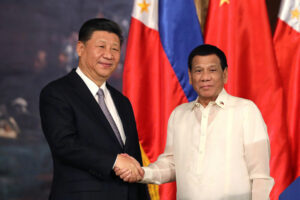
If it’s bad business, it’s bad for the Philippines
Our organization, the Stratbase ADR Institute, received an award from the prestigious Center for International Private Enterprise (CIPE), one of the four core institutes of the National Endowment for Democracy in Washington, DC. We were recognized for our research, advocacy, and strategic communication on four infrastructure projects entered into by the Philippines, during the administration of former President Rodrigo Duterte, under the Belt and Road Initiative of China.
We conducted the studies in 2020 and 2021, and these triggered the review and re-evaluation of the said projects. We highlighted the risks associated with unreliable investments in Philippine infrastructure and raised public awareness on their adverse implications on the economy and on society.
The Philippines’ location and geographic make-up is no doubt a crucial factor to other countries’ interest. Approximately a third of global maritime trade passes through the Malacca Strait, South China Sea, and West Philippine Sea which makes these waterways vital to the economy of the Indo-Pacific region. These sea lanes are critical as they serve as a conduit for energy supplies and goods between major economies in East Asia and the rest of the world. The West Philippine Sea serves as a home to submarine cables that connect the Philippines to global digital networks.
Barely weeks after he took office, then-President Rodrigo Duterte visited China and reported that his trip was “highly successful,” with China pledging $24 billion in loans and grants, mostly for infrastructure projects. And when Chinese President Xi Jinping made a state visit to the Philippines in 2018, 29 agreements were signed.
Only four of these pledges and agreements actually materialized.
Our studies found that all of them were infirm and economically disadvantageous to the communities that would be affected, and to the national economy in general.
We determined that the Chico River Pump Irrigation Project was a sweetheart deal, with defects in the consultation process, the lack of prior approval of the Monetary Board, and the pre-selection of the Chinese contractor. The Philippines stands to lose if it gets entangled in a legal battle with China in the event of a default. There are serious environmental degradation issues, from possible flooding to the risk of disturbing the biodiversity in the area.
Environmental issues also hound the Kaliwa Dam Project, touted to solve an impending water crisis, with challenges to the biodiversity of the area and to the way of life of the indigenous peoples. Political issues include the fairness of the loan agreement, the adherence to the rule of law, and to transparency and accountability. There are onerous provisions like the waiver of sovereign immunity, the confidentiality clause, and the arbitration terms. There are doubts about the deal’s compliance with internationally accepted competitive bidding processes. Our Commission on Audit said that the process appears rigged to favor the eventual winning contractor. It is apparent that this transaction tries to circumvent rules and put the rule of law at risk.
Duterte touted Dito Telecommunity as the would-be third major player in the telecommunication industry. But some legal technicalities immediately put Dito at a great advantage over competitors, who had to pay substantial, non-refundable fees in case they wanted to pursue legal remedies. Duterte told courts and government agencies not to interfere in the process. Cronyism was apparent in how tenaciously the government defended the consortium that included a friend and campaign contributor of the President. The consortium also threatened national security and the individual privacy of citizens.
The Safe Philippines Project, a network of CCTVs that has facial and vehicular recognition, was initially presented as an anti-crime tool. Again, security and privacy issues were crucial in this deal, given China’s behavior in the West Philippine Sea. Ironically, the Safe Project fails to make the country safe.
The Philippines has currently withdrawn from the Belt and Road Initiative and the current administration has been careful to consider other partners aside from China. After all, despite their pledges, the Chinese have not followed through on their promises and in fact, foreign direct investment (FDI) inflows in 2022 came from other countries such as Japan (35.06%), Singapore (28.81%), and the United States (14.68%), with a measly 0.92% coming from China. The following year’s figures were more illustrative, with FDI from Japan growing to 51%, the US 13%, and Singapore 12%. FDI from China dropped further to 0.18%.
Meanwhile, the trade between the Philippines and China is severely skewed to Chinese imports.
What our study revealed is that our country almost fell prey to China’s economic maneuvers under the guise of assistance. We must be careful and see economic statecraft for what it is — an evolving security risk to our country and our people.
We at Stratbase will continue to develop more strategically instructive studies, push for sound business and governance practices, and advocate for people’s awareness of economic decisions’ consequences on their way of life.
Victor Andres “Dindo” C. Manhit is the president of the Stratbase ADR Institute.



